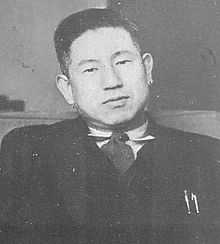Hotsumi Ozaki

Hotsumi Ozaki (尾崎 秀実 Ozaki Hotsumi, April 29, 1901 – November 7, 1944) was a Japanese journalist working for the Asahi Shinbun newspaper, communist, spy, and an advisor to Prime Minister Fumimaro Konoe. The only Japanese person to be hanged for treason (under the guise of the Peace Preservation Law) by the Japanese government during World War II, Ozaki is well known as an informant of the spy Richard Sorge. He wrote letters to his wife and daughter while imprisoned, published as Love is like a Shower of Stars.
Biography
Ozaki was born in what is now the town of Shirakawa, Gifu Prefecture, and a descendant of a samurai family.[1] His family relocated to Taiwan when he was a youth, and he grew up in Taipei. He returned to Japan in 1922, and enrolled in the Legal department of Tokyo Imperial University. Appalled by the actions of the government in the aftermath of the 1923 Great Kantō earthquake he turned to Marxism.[1] He left school without graduating in 1925, after becoming involved in the activities of the Japan Communist Party. In 1926, he joined the Asahi Shimbun newspaper,[1] where he wrote articles on Soviet leaders Vladimir Lenin and Joseph Stalin. He was transferred to the Osaka Mainichi Shimbun the following year.
He was critical of Japan's war with China. Believing that the Japanese military invading China was only radicalizing the Chinese revolution, and driving them into the hands of the Communists. "Why should the success of the Chinese revolution be to Japan's disadvantage?" was a question that haunted Hotsumi.[2]
From November 1928, Ozaki was dispatched to Shanghai in China, where he soon made contact with members of the Chinese Communist Party, including Agnes Smedley, and other members of the Comintern leadership based in Shanghai. Smedley introduced him to Richard Sorge in 1930.[1] After his return to Japan, he moved back to Tokyo in 1934 where he linked up with Sorge.
By writing books and articles Ozaki established himself as an expert in Sino-Japanese relations. Thus he was recruited by Ryūnosuke Gotō in 1937 to join the Shōwa Kenkyūkai, a think tank established by Prime Minister Fumimaro Konoe. From 1938, he was invited by Konoe to become a member of his inner circle, or “Breakfast Club”, of select members with whom he would confer on current events each week over breakfast. Ozaki, therefore, was in a position to participate in the making of decisions he was supposed to uncover.[1] Ozaki learned that Japan wanted to avoid a war with the Soviet Union, information that Sorge relayed to Moscow. On July 2, 1941 Ozaki as a member of the "Breakfast Club" supported a critical decision for Japanese expansion towards the Dutch East Indies and Singapore and against Hitler's request to invade Siberia.[1] He was outspoken in his opposition and concerns with regards to the decision reached at the Gozen Kaigi conference of September 6, 1941 that war with the United States was unavoidable.
Hotsumi would also recruit Miyagi Yotoku, an artist who would translate documents for Richard. Shu Yabe, a secretary to an Imperial Army general named Issei Ugaki, was also recruited. [3]
On October 15, 1941, Ozaki was arrested in conjunction with the Sorge Incident. During his trial, it was revealed that Ozaki had been working with Sorge since his return to Japan, and that through his close contacts with Konoe and other senior Japanese politicians, was able to gather information and to copy secret documents. Ozaki was executed on November 7, 1944.
While in prison, he wrote hundreds of letters to his wife, Eiko, who he was an unfaithful husband to, and who knew nothing of Ozaki's spy work, and his daughter Yoko. Ozaki acknowledged in his letters that he didn't want children due to the demands of his clandestine life. Still, the letters were able to let him rekindle his relationship with Eiko and Yoko. The letters also didn't hide his affections. Behavior that was rebellious to the stoic "Japanese male" way during that era. [4]
In the post war era, Ozaki became viewed as a patriot to the Japanese who loved his country more than the ultranationalists. Even Takada Tadashi, the judge who sentenced Ozaki to death, privately stated that he regarded Ozaki as "not merely a man of virtue and ideals, but as a model patriot." [5]
Further information
- Johnson, Chalmers. An Instance of Treason Ozaki Hotsumi and the Sorge Spy Ring. Stanford CA: Stanford University Press, Expanded edition 1990 ISBN 0-8047-1766-4 is the standard biography in English and also contains a wealth of information, much of it from a Japanese perspective, about Richard Sorge and his other collaborators.
- Whymant, Robert. Stalin's Spy: Richard Sorge and the Tokyo Espionage Ring. New York: St. Martin's Press, 1996. This is the latest book-length study of the Sorge ring and Ozaki in English.
In the arts
- No Regrets for Our Youth Nie żałuję swojej młodości(わが青春に悔なし) is a Japanese film loosely based on Ozaki, written and directed by Akira Kurosawa.
- In the 2003 film Spy Sorge, directed by Masahiro Shinoda and based on the life of Richard Sorge, Ozaki is played by Masahiro Motoki.
- Kinoshita Junji 木下順二, A Japanese Called Otto オットーと呼ばれる日本人. This play, centered on Ozaki, was first performed in 1962 and has been produced in Japan a number of times since, most recently in 2008. An English translation by Lawrence Rogers was published in Patriots and Traitors: Sorge and Ozaki: A Japanese Cultural Casebook, Merwin Asia, 2009.
References
- ↑ 1.0 1.1 1.2 1.3 1.4 1.5 Phillip Knightley. The Second Oldest Profession. W. W. Norton & Co, 1986. pp. 186–93. ISBN 0-393-02386-9.
- ↑ An Instance of Treason: Ozaki Hotsumi and the Sorge Spy Ring By Chalmers A. Johnson Page 5
- ↑ http://www.japantimes.co.jp/life/2010/01/31/life/sorges-spy-is-brought-in-from-the-cold/#.Utff5prTljo
- ↑ Embracing Defeat: Japan in the Wake of World War IIBy John W. Dower Page 193
- ↑ Embracing Defeat: Japan in the Wake of World War IIBy John W. Dower Page 194
|